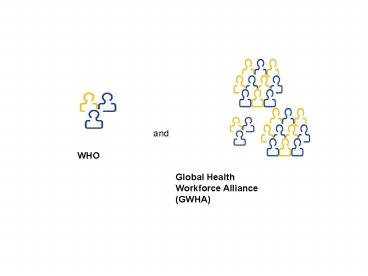WHO - PowerPoint PPT Presentation
Title:
WHO
Description:
and WHO Global Health Workforce Alliance (GWHA) A comprehensive response to the global human resources for health (HRH) crisis Prompted by 3 consecutive WHA ... – PowerPoint PPT presentation
Number of Views:3
Avg rating:3.0/5.0
Title: WHO
1
and
WHO
Global Health Workforce Alliance (GWHA)
2
WHY the Global Health Workforce Alliance (GHWA)?
- A comprehensive response to the global human
resources for health (HRH) crisis - Prompted by 3 consecutive WHA- generated
resolutions (2004, 2005, 2006) to address various
HRH issues - Helps accelerate the achievement of 2015 MDG
Goals specifically MDGs 4 and 5
3
The Global Health Workforce Alliance(GHWA)
2006
2008
2010
2011
1st Global Forum
GHWA launched
2nd Global Forum
Global CHW consultation
4
May 2006
GHWA launched
- a convener
- an open partnership
- not a funding entity
- board and a secretariat
- litmus test of GHWA efforts evidence
5
Human security approach to CHW
Central government
Top-down approach Protection
Local government
training, supervision oversight, authorization,
financing , logistics
Community Health Committee
selection of CHWs, identification of priorities
Bottom-up approach Empowerment
management, supervision oversight
participation
OWNERSHIP
motivation career advancement training
mobilization
Communities
6
April 2010
Global CHW consultation in Montreus,
Switzerland
- Objectives
- 1. Review the recommendations of the global
systematic reviews and 8 country case studies. - Share experiences.
- Develop a broad agreement on key messages for
countries to integrate CHWs into their national
health workforce.
7
- Global systematic review
- II. Case studies of country CHW Programs and
program review in 8 countries (Pakistan,
Bangladesh, Thailand, Ethiopia, Uganda,
Mozambique, Brazil, Haiti) - applied HCIs CHW assessment functionality tool
- visited countries to interview key personnel
- overseeing the program
- compiled information and reviews on programs
- (description, job descriptions, CHW roles)
including - evaluation reports and outcomes assessments
8
13 Key Messages
I. Planning, Production and Deployment (5)
- 1. Integrate CHWs fully into national HRH
plans and health systems. - 2. Involve key stakeholders in the
decision-making process. - 3. Ensure effective and robust monitoring and
evaluation throughout the policy and
implementation process or the scale-up of CHWs.
- 4. Any scale-up of CHWs has adequate support
including training, supervision, equipment and
supplies, transport. - 5. Existing health system should provide
enabling environment for CHW policies and
planned interventions.
9
II. Attraction and Retention (5)
- 6. Prepare and engage the community throughout
the process. - 7. Ensure a regular and sustainable stipend and,
if possible, complement it with other rewards. - 8. Ensure a positive practice environment.
- 9. Establish selection criteria, training
duration, and scope of tasks that are clearly
stated, publicized and respected by all
stakeholders. - 10. Provide an ongoing continuing education for
CHWs and, where possible, support opportunities
for career advancement.
10
III. Performance Management (3)
- 11. Governments should take responsibility for
the quality assurance of CHWs, even if CHWs are
trained and managed by civil society or private
not-for-profit groups. - 12. Performance management should be based on a
minimum set of need-based skills. - 13. The management and supervision of CHWs
should be team-based and development-focused, and
integrated with that of other health workers.
11
Summary and Key Points
- CHWs are integral to health systems strengthening
and overall global health - Increasing services considered to be effective at
the community level - Global health initiative emphasizes linking CHWs
to overall health system and - Pressure is on governments and NGOs to provide
support to CHWs in key areas, including
incentives, supervision, standardized training,
supplies. - Source Crigler L. Global Trends in CHW
Programs. USAID-funded HCI Project 2010































